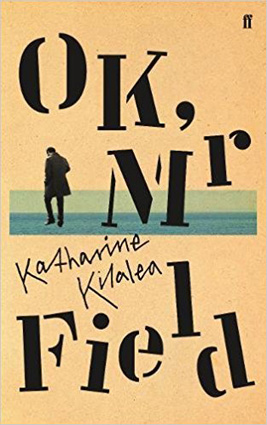It’s risky when poets become novelists. When a writer transitions from focusing on language and metre crafted into carefully honed short pieces to a sustained storyline centred on characters and plot, there’s a danger that the author’s ideas won’t show as robustly. Of course, there are plenty of poets who successfully wrote in both forms (such as Langston Hughes, Gertrude Stein, Sylvia Plath or Ben Lerner) and many books utilize elements of each form to gloriously withstand categorization (like Virginia Woolf’s The Waves).
Katharine Kilalea is a South African writer who moved to the UK where her poetry collection One Eye’d Leigh was nominated for multiple literary awards.OK, Mr Field is her debut novel which follows the beleaguered existence of its eponymous hero after a train accident that leaves him incapable of carrying on his career as a concert pianist. In some ways, this feels exactly like the sort of novel a poet would write: it’s meandering, image-focused and its characters remain vague outlines. But in other ways it’s crafted more like a philosophical or surrealist novel that seeks to defy metaphor and psychologically describes the difficult feelings of the solitary protagonist.
Mr Field was a renowned European musician, but after his debilitating accident he decides to uproot himself and his wife Mim to Cape Town where they reside in a replica of Le Corbusier’s ‘Villa Savoye’, set on the coastline. The long horizontal windows and free floor plan allow views of the sea. But Mim disappears fairly quickly leaving behind notebooks filled with trite descriptions comparing the ocean to the rhythms of human existence. Rather than seek out what has become of his wife, Mr Field sinks into a contemplative, directionless and lonely state, imagining the voices of birds or a dog or a widow named Hannah Kallenbach.
He obsessively lingers outside Hannah’s window preferring a muted form of observation rather than actually interacting with her. The very logic and rhythms of his existence are modulated by the modernist structure he resides within and the construction of a tower near his own property. This is no doubt highly influenced by the many years the author has spent working in an architecture practice and her current pursuit of a PhD focused on the experience of space in poetry. It allows for many interpretations and meanings as Mr Field is caught in an ambiguous state between fogginess and clarity, dreams and reality, life and death. Stripped of his passion he has become a stranger to himself and lacks a motivation in his life. He seems to want all the comforts of a home and a relationship but without engaging with real people. In this limbo-state he might be “a part of the unhappiness that’s come apart from the total mass of unhappiness” but outwardly he is essentially fine or at least “OK”.
Some of the most effective parts of the novel are the descriptions of Mr Field’s new relationship to music. His old piano - which had always inspired him in the past - becomes an object of resentment. He was never enthusiastic about playing Chopin’s famous Prelude or “Raindrop” piece which he feels verges on sentimentality. But now, with his injured hand, when he tries to practice this piece of music again it’s like his hands work as if they are unknown to each other: “the way my hands moved in relation to each other. They seemed to understand something about the piece that I had never understood myself. Before, they had been a pair, operating together, but now they were independent.” And the repeated A-flat note that is meant to simulate the steady sound of raindrops becomes a backdrop to Mr Field’s story just like the waves outside his windows. They are a reminder of the dull persistence of time amidst personal loss and riotous emotions. Mr Field, however, seems to feel curiously resistant to their being interpreted as such. It’s this tension: the desire to exist without residing within any larger symbolic meaning which makes the story of this novel so disarmingly innovative as well as frustrating in how it eludes meaning.
This is a deeply meditative novel whose curious tone teases out tantalizing questions about how we position ourselves in the world and about the gap between our inner and outer realities. The story knowingly resists any form of logical plot or certain conclusions. It’s a book that readers will most probably find either richly engaging or frustratingly tedious.
This review also appeared in the Open Letters Review: https://openlettersreview.com









